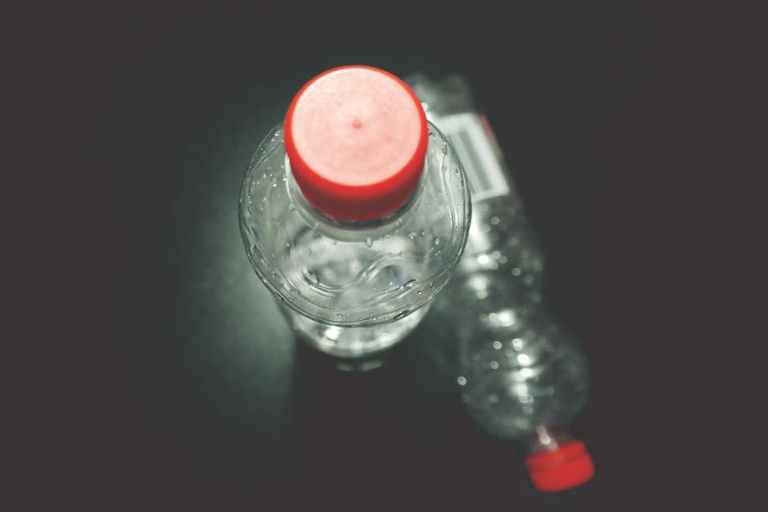6 Reasons To STOP Buying Bottled Water

Bottled water has become a regular part of everyday life for many Americans. We drink more bottled water than beer or milk. Entire aisles at the grocery store are full of it. But are we making a huge mistake?
Many of us have heard some of the logic behind why using bottled water is a bad idea. Yet we continue to purchase it anyway. Sometimes seeing the big picture laid out in front of your eyes can make things more clear.
Here are six reasons you should stop buying bottled water.
1. You’re Wasting Your Money
Bottled water is a huge global industry. That’s why there’s a trade association called the International Bottled Water Association, which works to improve the industry’s image and lobbies world governments on bottled water’s behalf.
Experts now say bottled water is poised to pass up carbonated soft drinks in the packaged beverage market as the number one product in the United States by the end of 2016. The soda giants like Pepsi and Coke aren’t bothered by this news because they sell their own brands of bottled water.
North America is by far the largest consumer of bottled water. Mexico uses the most per capita, but people in the United States are spending a ton of money on it, topping $15 billion in 2015 according to research by Mintel. Other estimates say Americans spend around $100 per person on bottled water each year.
Numbers comparing how much more expensive bottled water can be cover a wide range. Depending on what you purchase, drinking bottled water could be anywhere from 300x to 2,000x more expensive than getting it from your home faucet.
2. Many Brand Are Selling You Tap Water
The quality of the bottled water you buy is going to vary quite a bit. Much of it is nothing more than municipal water that goes through some filtration at the bottling plant. The National Resources Defense Council (NRDC) estimates around 25% comes straight from the tap, and some of it isn’t even further treated. Manufacturers of bottled water are good at marketing. They use the right words to make you think their product is the purest, most refreshing water imaginable.
Remember, water filtration is something you can do in your own home if you choose.
Do you ever drink Aquafina bottled water? PepsiCo recently admitted that its brand of bottled water is nothing more than filtered tap water, and the company was forced to change the labeling on Aquafina. Consumer groups are now targeting Coca-Cola’s Dasani brand of bottled water too.
Check the labeling on your favorite bottled water. If it says “Public Water Source,” you are drinking packaged tap water.
3. Bottled Water Can be Contaminated
We’re not trying to scare you. Most bottled water is likely safe. However, the bottled water industry does not have a perfect track record.
An article from CBS.com states there have been more than 100 recalls of bottled water. The article lists common water contaminants like algae, types of bacteria, and chlorine. But it also mentions things like glass particles, mold, and even crickets were found in Texas bottled water back in 1994. More recently, a North Carolina woman claimed she found larvae in her Dasani bottled water. Coca-Cola disputed the claim.
Keep in mind, while the FDA does have some standard for water bottlers, it cannot regulate water that’s bottled and sold within the same state. You have to look carefully to find the truth. In many ways, regular city water is more regulated than bottled water.
4. Buying Bottled Water Hurts the Environment
Drinking bottled water creates unnecessary waste. You might think that shouldn’t be a problem because water bottles can be recycled. Unfortunately, that’s not what is happening. The majority of those bottles end up in a landfill.
In 2015, The Association of Plastic Recyclers reported that the recycling rate for plastic bottles reached 31.8% – a 1% increase year over year. However, that still means more than two-thirds of plastic bottles do not get recycled. Two-thirds of 50 billion bottles a year is a lot! Americans are using 2.5 million plastic bottles every hour, and bottled water makes up a sizable chunk.
The waste created by plastic bottles isn’t even the worst of the environmental impact. It’s the production and transportation that is truly hurting the planet.
Peter Gleick is an environmentalist who authored the book Bottled and Sold, which criticizes the bottled water industry. He conducted a study estimating bottled water requires 2,000 times as much energy cost as tap water.
Gleick’s report, which was published in 2008 concludes:
“Given an annual consumption of 33 billion liters of bottled water in the US, we estimate that the annual consumption of bottled water in the US in 2007 required an energy input equivalent to between 32 and 54 million barrels of oil or a third of a percent of total US primary energy consumption. We estimate that roughly three times this amount was required to satisfy global bottled water demand.”
5. Plastic Bottles Could be Harmful to Your Health
A big reason for the rise in bottled water is that many people are trying to be healthier. That’s great! Water is essential to a healthy body and mind, but plastic bottles could be an issue.
The biggest problem is BPA or bisphenol-A. According to the Mayo Clinic’s website:
“Some research has shown that BPA can seep into food or beverages from containers that are made with BPA. Exposure to BPA is a concern because of possible health effects of BPA on the brain, behavior and prostate gland of fetuses, infants and children.”
You’ll find a few bottled waters being marketed as BPA-free. However, some researchers are calling foul. They say the chemicals used to replace BPA may be just as dangerous.
The recyclable PET plastic bottles may come with their own health risks. Chemicals known as phthalates have the potential to leach from the plastic into the water. Phthalates are known endocrine disruptors, which means they have the potential to mess up your hormones.
This is more likely if you let your water sit in a plastic bottle for a long time and allow it to be exposed to heat or sunlight. This increases the risk of plastic breaking down and getting into the water.
The NRDC tested more than 1,000 bottles of water and concluded, “There is no assurance that just because water comes out of a bottle it is any cleaner or safer than water from the tap.”
Even the government has publicly stated that in-home water filtration is a better idea than bottled water if you want to be healthier. An annual report from the President’s Cancer Panel states:
“Filtering home tap or well water can decrease exposure to numerous known or suspected carcinogens and endocrine-disrupting chemicals. Unless the home water source is known to be contaminated, it is preferable to use filtered tap water instead of commercially bottled water.”
6. Bottled Water May Not Even Taste Better
With all the money we spend on bottled water, you would think there is some sort of benefit. Even if it’s not healthier for you, it has to taste better, right? If it does, it’s probably the placebo effect.
Time after time, blind taste tests show most people can’t really tell the difference between bottled water and tap water, much less specific brands of water.
One of the most interesting taste tests involved Fiji bottled water. It launched a marketing campaign that made fun of Cleveland’s water. The campaign stated, “The label says Fiji because it’s not bottled in Cleveland.”
Cleveland took offense to that and had Fiji water tested. Turned out, it contained 6.31 micrograms of arsenic. Then Cleveland held a taste test pitting Fiji’s water against the city’s. We bet you can guess who won.
There’s a Smarter Way to Get Better Drinking Water
Household water can be quite different in terms of quality and taste depending on where you live, the plumbing in your home, and your personal preference. It’s certainly possible that your tap water isn’t the best to be drinking.
The 2015 Water Quality Association report on consumer opinions found 77% of survey respondents use bottled water. At 41%, the top reason cited in the survey for choosing bottled water was their tap water didn’t taste good. Another 37% said they had concerns about contaminants in the water.
Bottled water is certainly not the only solution!
If you’ve read all these points and feel a little bit duped by bottled water marketing, it’s not too late to make a change to your water drinking habits.
In-home filtration can transform your tap water, making it safe and enjoyable to drink. Products like reverse osmosis systems provide you with the purest, most-refreshing water right at your tap.
Post Originally by The Water-Right Group
Ready to Take Control of Your Water Supply?
Don’t wait for water shortages or unreliable sources to disrupt your life. With our Rainwater Harvesting systems, you can enjoy a sustainable, reliable, and completely self-sufficient water solution tailored to your home’s needs.

